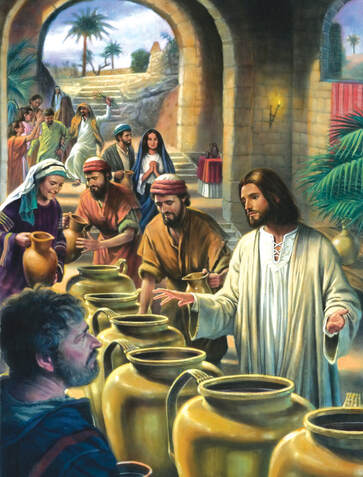John 2:1-25
Lesson 167
Lesson 167
Read both the "King James Bible" and the "New Living Translation."
In this lesson:
Jesus' first miracle.
Also,
Merchants and money changers.
Jesus knows the human heart (2:24-25).
Jesus' first miracle.
Also,
Merchants and money changers.
Jesus knows the human heart (2:24-25).
Jesus turns water into wine.
Study Tip:
As you read the Bible, listen closely to what God is telling you.
As you read the Bible, listen closely to what God is telling you.
Where was -
Cana -
Located sixteen miles southwest of Capernaum and five miles north of Jesus' hometown of Nazareth, Cana was the home of the disciple Nathanael (John 21:2) and the scene of Jesus' first miracle, turning water into wine (John 2:1-11; 4:46). Cana is only mentioned in John's Gospel.
Capernaum -
Capernaum was a large city on the north-west shore of the Sea of Galilee and the hometown of several disciples. Located on the main highway from Damascus to Acco and Tyre, Capernaum was a bustling center of commerce. It also boasted a thriving fishing industry. A customs station (Matthew 9:9; 17:24; Mark 2:14; Luke 5:27) and a large contingent of Roman soldiers were stationed there, and the city became known for its moral excesses. The disciple Peter owned a house in Capernaum, and Jesus made it His center of operations while in Galilee (as prophesized in Isaiah 9:1-2 and discussed in Matthew 4:13-16). Because its citizens witnessed many divine miracles (Matthew 8:14-16; Mark 1:30-34; Luke 4:38-41) yet still rejected Christ, Jesus denounced the city in Matthew 11:23 and Luke 10:15. It's ancient remains have been excavated near the modern-day town of Tell Hum. Among the ruins are the remains of a synagogue unearthed in 1905 by a German archeology team. It could be the same synagogue built by the Roman centurion who sought a miracle from Jesus (Matthew 8:5-8; Luke 7:1-10).
The Temple -
King Solomon built the original Temple (House of Jehovah) in Jerusalem in 956 BC following God's instructions laid out in 1 Kings 6:11-37. It took seven years to build (1 Kings 6:38) with each stone, beam, and component made off-site and then painstakingly moved into place without the use of hammers, axes, or iron tools (1 Kings 6:7). The Temple was the center of worship and the teaching of Judaism. It was where religious sacrifices were made, and it held the holy relics sacred to Jews. The Temple was destroyed by the Babylonians in 586 BC when they sacked Jerusalem and carried Jews away into captivity (2 Kings 25:1-30). The Temple was rebuilt in 515 BC after the Jews returned from captivity (Ezra 1:1-4:24). Beginning around 15 BC, King Herod the Great embarked on an eighty-year program to improve and expand the Temple. Although the Temple of Jesus' day had been under reconstruction for forty-five years (John 2:20) and was fully functional and stunning to see, it was not yet finished. Remodeling took another thirty-five years to complete. The Temple was made up of numerous buildings and was an awe-inspiring sight. Tens of thousands of workers labored for decades to build the Temple complex. The main gate was adorned with gold, silver, and polished brass and stood an amazing seventy-five feet tall and sixty feet wide. This is probably the gate that Acts 3:2 calls "beautiful." The Temple walls facing the east were decorated with gold and appeared to shimmer in the morning sun. The other walls were made of beautiful white marble. The largest of the building stones were twenty-seven feet long and weighed an unbelievable
two hundred tons. Some of these stones were decorated with gold. The royal portico was over nine hundred feet long and boasted one hundred and sixty columns. There were several porches; the longest was called Solomon's porch and was nearly sixteen hundred feet long. No wonder the disciples wanted to take Jesus on a sightseeing tour of the Temple (Matthew 24:1). The disciples couldn't imagine the Temple's destruction unless the world was ending. Five years after its completion, in AD 70, Jerusalem was destroyed by the Roman army in response to a Jewish uprising. Just as Jesus prophesied (Matthew 24:2; Mark 13:1-2; Luke 19:41-44; 21:5-6), the Temple was burned and pulled apart stone by stone to collect the melted gold leaf.
Cana -
Located sixteen miles southwest of Capernaum and five miles north of Jesus' hometown of Nazareth, Cana was the home of the disciple Nathanael (John 21:2) and the scene of Jesus' first miracle, turning water into wine (John 2:1-11; 4:46). Cana is only mentioned in John's Gospel.
Capernaum -
Capernaum was a large city on the north-west shore of the Sea of Galilee and the hometown of several disciples. Located on the main highway from Damascus to Acco and Tyre, Capernaum was a bustling center of commerce. It also boasted a thriving fishing industry. A customs station (Matthew 9:9; 17:24; Mark 2:14; Luke 5:27) and a large contingent of Roman soldiers were stationed there, and the city became known for its moral excesses. The disciple Peter owned a house in Capernaum, and Jesus made it His center of operations while in Galilee (as prophesized in Isaiah 9:1-2 and discussed in Matthew 4:13-16). Because its citizens witnessed many divine miracles (Matthew 8:14-16; Mark 1:30-34; Luke 4:38-41) yet still rejected Christ, Jesus denounced the city in Matthew 11:23 and Luke 10:15. It's ancient remains have been excavated near the modern-day town of Tell Hum. Among the ruins are the remains of a synagogue unearthed in 1905 by a German archeology team. It could be the same synagogue built by the Roman centurion who sought a miracle from Jesus (Matthew 8:5-8; Luke 7:1-10).
The Temple -
King Solomon built the original Temple (House of Jehovah) in Jerusalem in 956 BC following God's instructions laid out in 1 Kings 6:11-37. It took seven years to build (1 Kings 6:38) with each stone, beam, and component made off-site and then painstakingly moved into place without the use of hammers, axes, or iron tools (1 Kings 6:7). The Temple was the center of worship and the teaching of Judaism. It was where religious sacrifices were made, and it held the holy relics sacred to Jews. The Temple was destroyed by the Babylonians in 586 BC when they sacked Jerusalem and carried Jews away into captivity (2 Kings 25:1-30). The Temple was rebuilt in 515 BC after the Jews returned from captivity (Ezra 1:1-4:24). Beginning around 15 BC, King Herod the Great embarked on an eighty-year program to improve and expand the Temple. Although the Temple of Jesus' day had been under reconstruction for forty-five years (John 2:20) and was fully functional and stunning to see, it was not yet finished. Remodeling took another thirty-five years to complete. The Temple was made up of numerous buildings and was an awe-inspiring sight. Tens of thousands of workers labored for decades to build the Temple complex. The main gate was adorned with gold, silver, and polished brass and stood an amazing seventy-five feet tall and sixty feet wide. This is probably the gate that Acts 3:2 calls "beautiful." The Temple walls facing the east were decorated with gold and appeared to shimmer in the morning sun. The other walls were made of beautiful white marble. The largest of the building stones were twenty-seven feet long and weighed an unbelievable
two hundred tons. Some of these stones were decorated with gold. The royal portico was over nine hundred feet long and boasted one hundred and sixty columns. There were several porches; the longest was called Solomon's porch and was nearly sixteen hundred feet long. No wonder the disciples wanted to take Jesus on a sightseeing tour of the Temple (Matthew 24:1). The disciples couldn't imagine the Temple's destruction unless the world was ending. Five years after its completion, in AD 70, Jerusalem was destroyed by the Roman army in response to a Jewish uprising. Just as Jesus prophesied (Matthew 24:2; Mark 13:1-2; Luke 19:41-44; 21:5-6), the Temple was burned and pulled apart stone by stone to collect the melted gold leaf.




